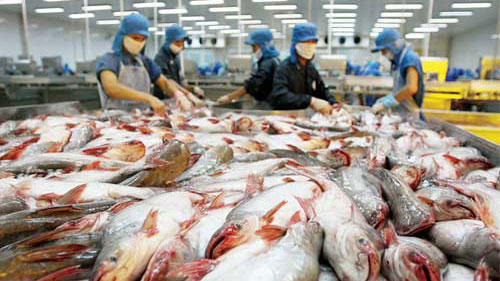Vietnam’s basa fish becomes well-known thanks to lawsuits
Friday, 11:15, 17/07/2015
Vietnam had to overcome serious difficulties in the thorny path to bring basa or catfish (Pangasius bocourti), to the US about 10 years ago.
Since then, it has faced many lawsuits to retain the market. However, these lawsuits have helped promote Vietnam’s basa fish worldwide.
The deputy chair of the Vietnam Association of Seafood Exporters and Producers (VASEP), Nguyen Huu Dung, believes he was one of the first persons arriving in the US in 1995, after the US declared normalization of diplomatic relations with Vietnam.
Dung was one of many people who witnessed Vietnam’s basa overcoming barriers to penetrate the US market.
In October 1998, the first group of US officials and five businessmen in the seafood industry paid a working visit to Vietnam.
After attending a workshop in Hanoi, the officials and businessmen left for An Giang province, a catfish farming center in the south of Vietnam.
Two out of the five businessmen were Vietnamese-American, and one of them was Ngo Hua, from California.
The guests were treated with many dishes made of basa and all of them gave positive comments about the fish. Later, Hua told Dung: “Dung, this is not fish, this is gold”.
After returning to the US, Hua began developing a brand for basa. In March 2000, Hua introduced Mekong Basa, a registered brand, at Boston Seafood Trade Fair.
The basa exports to the US began increasing rapidly in 2002. But in 1999-2002, the US had tried many measures to prevent exports of the fish.
The first challenge Vietnam faced was the dispute about the name. The US argued that ‘catfish’ must not be the name for Vietnam’s basa, because it is the name of catfish in the US.
And an anti-dumping lawsuit against Vietnam’s basa was filed in the US in June 2002, when basa exports to the US were very modest, substantially less than the huge amount of 300,000 tons of catfish produced in the US every year.
Vietnam, as the defendant, has had to spend a great deal of time and money on the lawsuit over the last over 10 years. However, the lawsuit helped Vietnam’s tra and basa fish become famous all over the world.
Importers from Europe flocked to Vietnam after hearing about Vietnam’s fish. In just five years, from 2003 to 2008, exports to Europe accounted for nearly 50% of the Vietnam’s total tra and basa export volume, worth US$1.4 billion in 2008.
Vietnam’s tra and basa are not only present in the US and Europe, but in 136 markets in the world.
The deputy chair of the Vietnam Association of Seafood Exporters and Producers (VASEP), Nguyen Huu Dung, believes he was one of the first persons arriving in the US in 1995, after the US declared normalization of diplomatic relations with Vietnam.
Dung was one of many people who witnessed Vietnam’s basa overcoming barriers to penetrate the US market.
In October 1998, the first group of US officials and five businessmen in the seafood industry paid a working visit to Vietnam.
 |
After attending a workshop in Hanoi, the officials and businessmen left for An Giang province, a catfish farming center in the south of Vietnam.
Two out of the five businessmen were Vietnamese-American, and one of them was Ngo Hua, from California.
The guests were treated with many dishes made of basa and all of them gave positive comments about the fish. Later, Hua told Dung: “Dung, this is not fish, this is gold”.
After returning to the US, Hua began developing a brand for basa. In March 2000, Hua introduced Mekong Basa, a registered brand, at Boston Seafood Trade Fair.
The basa exports to the US began increasing rapidly in 2002. But in 1999-2002, the US had tried many measures to prevent exports of the fish.
The first challenge Vietnam faced was the dispute about the name. The US argued that ‘catfish’ must not be the name for Vietnam’s basa, because it is the name of catfish in the US.
And an anti-dumping lawsuit against Vietnam’s basa was filed in the US in June 2002, when basa exports to the US were very modest, substantially less than the huge amount of 300,000 tons of catfish produced in the US every year.
Vietnam, as the defendant, has had to spend a great deal of time and money on the lawsuit over the last over 10 years. However, the lawsuit helped Vietnam’s tra and basa fish become famous all over the world.
Importers from Europe flocked to Vietnam after hearing about Vietnam’s fish. In just five years, from 2003 to 2008, exports to Europe accounted for nearly 50% of the Vietnam’s total tra and basa export volume, worth US$1.4 billion in 2008.
Vietnam’s tra and basa are not only present in the US and Europe, but in 136 markets in the world.
